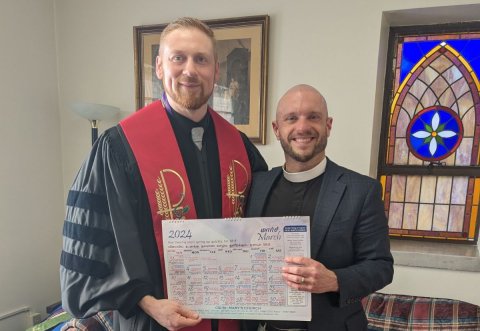
A guest article by the Rev. Dr. Benjamin D. Giffone
I stumbled into Grace Anglican Church of Grove City, Pennsylvania, on a Sunday evening in July 2023, seeking refuge.
This was not what you might think: the classic "come to Jesus" moment, the sinner’s prayer, the weight of sin lifted instantly. My situation was different: I was a pastor in another local church, but my church was splitting before my eyes, and it was clear that I could not stay. I had moved my family across the sea (we had been missionaries in Europe) and to a part of the US that we didn’t know, to serve this church—and within eight months, it was over. I was unable to lead the congregation to resolve their differences, and more than half of the members left.
As my family began attending Grace Anglican in this season, while I finished my “lame duck” weeks as an outgoing pastor, I felt shame, anger, sorrow, and befuddlement. Hadn’t I been called into ministry and ordained? Why did God allow this to happen to my family?
We all know stories of people put through the shredder of ministry, tossed aside by their congregation and mostly forgotten. Many pastors leave the ministry due to conflict within or even mistreatment by their congregations. Who is there to shepherd and heal the shepherds?
My presbytery encouraged me and my family to engage in a process of healing, growth and discernment through PIR Ministries, which is designed for pastors who have separated from their congregations under circumstances beyond their control. The pastor is taken under the wing of another church, called the “refuge church,” and may be given the honorary title of “pastor-in-residence” and some ministry tasks. But the main work of PIR is between the pastor-in-residence, his or her spouse, and the “refuge small group” of compassionate and insightful lay people trained to help the pastor-in-residence move towards healing, flourishing, and—hopefully—readiness to return to full-time ministry.
Raised in low-church evangelicalism, I had a soft spot in my heart for Anglicanism since college, when I sometimes attended a local Episcopal church as well as a Baptist church. I eventually split the difference and became Presbyterian—but we often attended Anglican churches during our world travels. The Book of Common Prayer is part of my daily prayers and my public pastoral prayers and the Anglican liturgy is a known quantity—we would always hear the Gospel message and both testaments—and even if the sermon wasn’t good, at least it would be shorter than a Presbyterian sermon!
During those painful weeks, Grace Anglican facilitated my transition to pastor-in-residence, and during my family’s year-long sojourn, we have been blessed by the Anglican structures of worship, but also by the gospel culture in the congregation that makes those forms meaningful.
We have found grace and love, and God’s acceptance that nevertheless summons us into ongoing sanctification. As a vibrant intergenerational church, Grace Anglican has been a great community for our family, a place for our kids to just be, not be “the pastor’s kids.” My wife joined a women’s Bible study and both of us played music in worship, and our kids attended the youth ministry. Grace’s services are on Sunday evenings, so I regularly preached at other churches in our area on Sunday mornings.
There is a true ecumenical spirit among the clergy and the laity at Grace. For some, “ecumenical” connotes a slide toward liberalism—“You go soft on your doctrines, and I’ll go soft on mine.” True ecumenism recognizes theological and cultural differences between believers but regards faithful Christians and church bodies as brothers and sisters in the global “household of faith.” The Rev. Ethan Magness, Grace’s rector, embodies this generous and faithful ecumenical spirit, and with the other clergy he welcomed me into the ministry life of the parish. I was invited to wear my black Geneva gown and stoles (“♪♫ One of these things / is not like the other ♪♫”) and process with the chancel party each Sunday. I sometimes led the prayers, and I served in visitation and prayer ministry. I preached several times through the year and taught a Christian education series on the book of Isaiah. These invitations to serve helped me to feel useful to God’s kingdom during a season of perceived uselessness. (I was also privileged, in a separate leading of Providence, to serve as a hospice chaplain under the tutelage of the Rev. Claire Megles, who also ministers in the diocese and attends Grace.)
In addition to this symbolic and spiritual support, Grace Anglican also helped our family in many tangible ways. Grace’s vestry allowed our financial supporters (friends and financial partners from our time in missions) to donate towards a partial salary for me and expenses for my mission trip to India in March.
Finally, the Rev. Magness recruited for us just the right people to serve our “refuge small group,” who helped us explore our struggles in ministry. We discovered that the process by which we discerned a call to the disastrous church was tainted by hurts from the way that we left our previous ministry abroad. This careful and thoughtful counseling has improved our communication as a couple and prepared us to discern what is next.
At its heart, Grace Anglican is a “sending church.” Hundreds of students from Grove City College and Slippery Rock University worship at Grace during the year, and a quarter of them are sent off into the world every May. Grace has also sent missionaries to other parts of the US and abroad.
God has used Grace Anglican as a place of refuge and growth for me and my family, and soon it will be our turn to be “sent”: even though we will still live locally, I have accepted a call to serve another church as pastor.
We stumbled into Grace with heads bowed low; we are sent out with our heads lifted heavenward, in dignity and joy.
I am especially grateful to the Rev. Magness for enthusiastically championing the PIR process at Grace Anglican, and also to the vestry of Grace Anglican and Bishop Cameron for giving their approval and support. Soli Deo Gloria!
“But you, O LORD, are a shield about me, my glory, and the lifter of my head.” (Psalm 3:3)
“Bear one another’s burdens, and thereby fulfill the law of Christ…. So then, while we have opportunity, let us do good to all people, and especially to those who are of the household of the faith.” (Galatians 6:2, 10)
The Rev. Benjamin D. Giffone, PhD, is a teaching elder (pastor) in the Presbytery of the Alleghenies, of the Evangelical Presbyterian Church. He is also an associate professor at Hindustan Bible Institute & College in Chennai, India.
Learn more about Benj’s ministry at www.giffonefamily.com.
